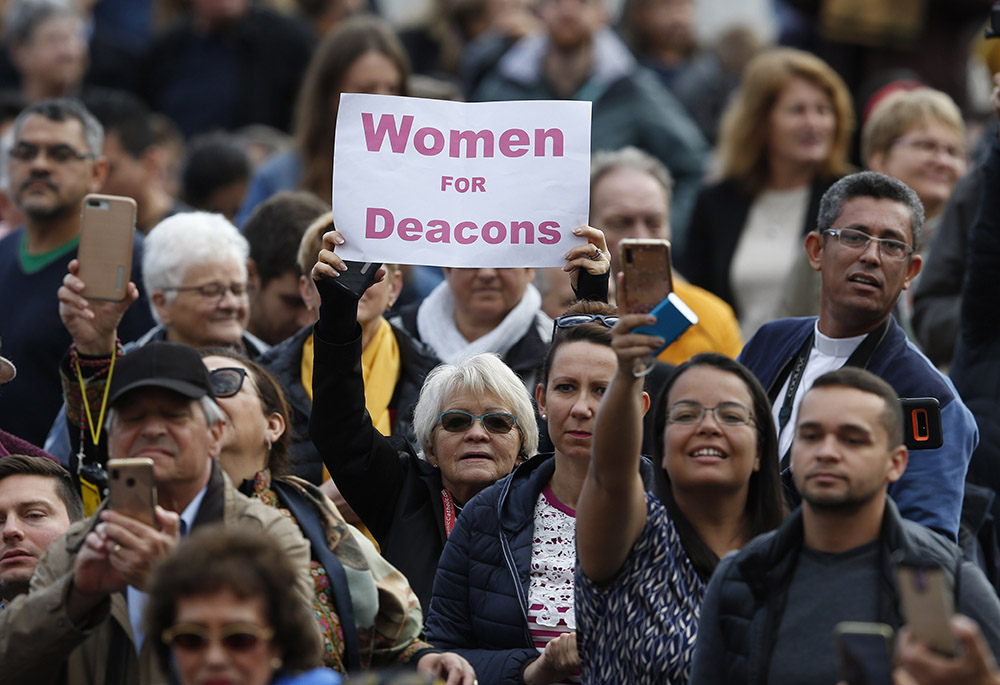Iowa Hawkeyes guard Caitlin Clark (22) controls the ball against Connecticut Huskies guard Nika Muhl (10) in the Final Four of the women's 2024 NCAA Tournament April 5. Clark, the NCAA basketball all-time scoring record holder, now plays for the WNBA's Indiana Fever. (OSV News/ Kirby Lee-USA TODAY Sports via Reuters)
Thousands of new eyes are on the WNBA, as women's sports are at the center of a huge surge in popularity. Nearly every viewership record has been broken and reset this summer, including game attendance, sellouts and TV viewers. Caitlin Clark, the NCAA basketball all-time scoring record holder and WNBA first draft pick, is bringing unparalleled attention to the WNBA. Hundreds of thousands of people who have never tuned into a WNBA game before are watching Clark, along with rookies Angel Reese, Cameron Brink and Kamilla Cardoso.
As an avid WNBA fan, part of me is sighing "finally," as the world understands the incredible entertainment of this league. However, the increased attention has also brought an increase in news stories, media attention and social media discourse that frustrates me.
Sports journalist Lindsay Gibbs wrote in her Substack Power Plays,
I, of course, feel elated and vindicated and energized. But I also feel angry that it didn't happen sooner. I feel protective and almost territorial listening to people — especially media members — who have never paid attention to the sport before suddenly present as experts. I feel resentful that the women's sports community is expected to graciously roll out the welcome mat for people who have either ignored, insulted, or outright impeded the growth of women's basketball for decades. I feel guilty for said resentment, because isn't this what we’ve been asking for all along?
As a Catholic woman and feminist theologian, I feel a similar combination of relief, excitement and frustration. It is impossible for me to ignore the parallels between the explosion in WNBA popularity and the recent conversations about women's roles in the church. For decades, women lay ministers in the church have been trying to convene conversations around women's roles in the church. In 1975, more than 1,200 people participated in the first Women's Ordination Conference. Nearly 50 years later, broaching the topic of women's ordination can feel revolutionary. The synod on synodality is raising the topic of women's roles in the church, which fills me with excitement. Yet, when Pope Francis makes a passing comment that women's ordination to the diaconate will not happen, I am left frustrated by how a simple comment can appear to sidetrack the collective work of communities and women in particular.

A woman holds a sign in support of women deacons as Pope Francis leads his general audience in St. Peter's Square Nov. 6, 2019, at the Vatican. (CNS/Paul Haring)
Additionally, I observe a similar pattern in expectations of women in women's sports as well as in women's roles in the church. There is a sense that women should be grateful for the little attention that they are given. For example, former NBA player Austin Rivers said that WNBA players should be grateful for Caitlin Clark and Charles Barkley called WNBA players petty for playing competitively with Clark. Barkley said, "Y'all should be thanking that girl [Clark] for getting y'all [expletive] private charters. All the money and visibility she's bringing to the WNBA, don't be petty like dudes." Twisted gender roles aside, these comments exemplify the sentiment filling comment sections and social media feeds: WNBA players specifically, and women in general, should be grateful for this attention and platform.
This sense of scarcity also arises in discussions around women's roles in the church. Some advocates of women in the diaconate do not allow the "p" word to be mentioned: priests. This is guided by a notion that the focus should be on what is attainable. The debate over whether to advocate for change that is realistic or advocate for change that would create a more just situation is a common debate.
The sports industry is shaped by patriarchal structures, as is the hierarchy of the Roman Catholic Church. It is helpful to attend to patterns of oppression and injustice when addressing a situation. Rather than taking the status quo as neutral, we should be mindful of how forces of oppression are at play. There are often sources within the tradition to respond to unjust structures.
Advertisement
I am reminded of the Canaanite woman who followed Jesus and asked him to heal her daughter. Jesus did not respond, and at the urging of his disciples, he shooed her away by saying, "I was sent only to the lost sheep of Israel" (Matthew 15:24). Undeterred, the woman knelt before Jesus and once again asked for help. Jesus continued to refuse to help, saying, "It is not right to take the children's bread and toss it to the dogs." The woman responded, "Even the dogs eat the crumbs that fall from their master’s table" (Matthew 15:27). At this, Jesus was moved by her faith and healed her daughter.
This Gospel story holds up the Canaanite woman as a model of faith. Far from being happy with what lands her way, she advocates for herself, her daughter — and more broadly — a more just way of relating to one another. The Canaanite woman continues to be a model of discipleship for me, especially when I am frustrated by Pope Francis' comments or an experience of gatekeeping women's ministry at my parish. Rather than just accepting an exclusionary decision, the Canaanite woman is an example for seeking justice in a world marked by injustice.
We've lost the plot if the discourse is about how women should be acting rather than how the entire system should be reformed to promote greater justice and equity.
Collectively, we are debating the roles and conduct of women. But deeper below the surface are expectations related to gender expressions and women's roles. LA Sparks rookie Cameron Brink said in a recent interview,
"There’s a privilege for the younger white players of the league. That's not always true, but there is a privilege that we have inherently, and the privilege of appearing feminine. Some of my teammates are more masculine. Some of my teammates go by they/them pronouns. I want to bring more acceptance to that and not just have people support us because of the way that we look."
In a league that is majority Black and majority queer, there are really important conversations to have around gender expression, trans inclusion and racism. But we can't even have that conversation because we are too busy arguing over basic things.
We've lost the plot if the discourse is about how women should be acting rather than how the entire system should be reformed to promote greater justice and equity. Systems that were intentionally created to divide along gender lines are the problem, not rookies vs. veterans or ordination to the diaconate vs. priesthood. When all we have are crumbs from the table, it is easy to fight over who gets which crumb. We should focus on rearranging the table, rather than squabble over scraps.








